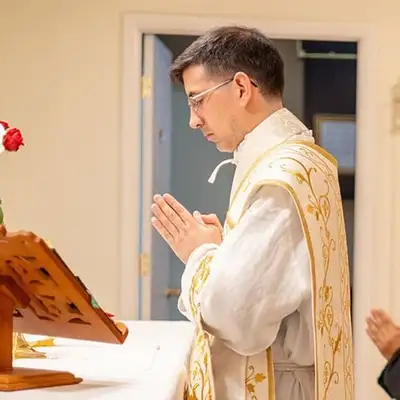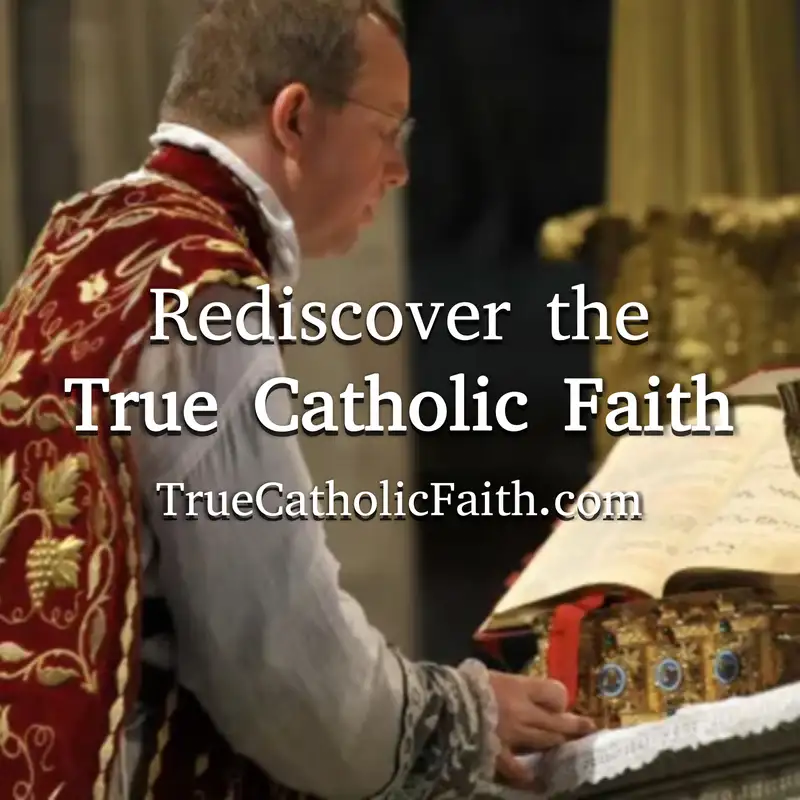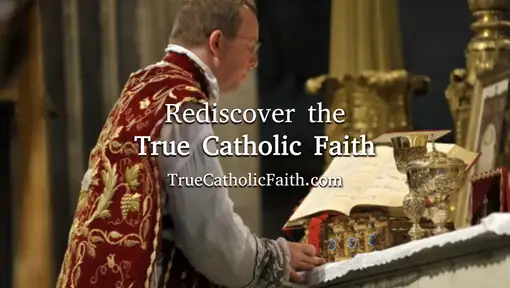Saints Peter and Paul, Faith in Christ's Promise - Fr. Federico Palma 06-29-25
Download MP3And I say to thee that thou art Peter, and upon this rock, I will build my church, and the gates of hell shall not prevail against it. In the name of the Father and of the Son and of the Holy Ghost. Amen.
Fr. Federico Palma:That is, as we all know, the infallible promise of Christ to his church. That promise addressed in particular to Saint Peter, the first pope, and in his person to all his true successors throughout time.
Fr. Federico Palma:And the promise was clearly addressed and given to Peter and all the featured true popes of the Catholic church. There is a clear intention on the part of Christ to make sure everyone understood at that particular moment that his promise was referred in particular and especially to Saint Peter because he goes from the plural. He's speaking to all of the 12 at that moment, and then he, all of a sudden, if you want, changes the plural into the singular. And he says, thou art. Before, he was speaking to all of them, but now he wants to make a point.
Fr. Federico Palma:Thou art Peter, and upon this rock I will build my church, and the gates of hell shall not prevail against it. Needless to say that our Lord refers to his church as his church, my church. And that is a very important point later on that we will discuss in this sermon. My church, that is to say, there is only one true church founded by Christ. He did not say the plural there.
Fr. Federico Palma:He didn't say my churches or churches in a vague way. My church, the true church founded by him, established today by the blood of these two great apostles of the Catholic church, founders of the Roman church, Saint Peter above all, and then Saint Paul. And it has been more than a month already since we have this claimant to the papacy, Leo the fourteenth. And with the pass of time, things become once again more clear. It is important to remember that it is because of this verse I read in the beginning that we ultimately ultimately speaking are here.
Fr. Federico Palma:We are here because of the promises of Christ. The promises of Christ are infallible, are going to take place. And because of that, the Catholic faithful correctly concluded back then during the changes of the so called Vatican II Council and all the reforms that took place after that so called council, the Catholic faithful, as I said, rightly concluded that that religion that emerged from that council was not the religion previously taught by the church. And secondly, the Catholic faithful concluded, and rightly so, that by the same token and because of the promises of Christ, those who promulgated such a, quote, unquote, council with all those heretical teachings and errors, those who promulgated, those who enforced those new doctrines contrary to previous ones did not, by the same token, did not hold the authority of Christ to rule upon his church. And therefore, the Catholic faithful faithful rightly concluded that they were not true popes.
Fr. Federico Palma:This is based on the promises of Christ which cannot possibly fail. The Catholic faithful already adhere and profess to Catholic teachings and therefore cannot possibly at the same time adhere to contrary teachings. Let me explain what I mean by that. A Catholic cannot possibly at the same time, profess and believe in the blessed trinity that God indeed is the father, the son, and the Holy Ghost, three divine persons, one true God. A Catholic cannot believe that and at the same time believe that in God there are no persons.
Fr. Federico Palma:Such a belief that Muslims have and Jews have nowadays. The Catholic faithful cannot possibly believe in those two statements at the same time even even if one tried to do that. It would be something similar as holding as true that something as simple as one plus two one plus one is two and at the same time holding that one plus one is three. Even if you tried to reconcile the two statements in your intellect, you will not be able to do that. And therefore, as I said, because of the promise of Christ, the Catholic faithful rightly concluded in rejecting this new religion because that's the technical way to say it, to avoid to avoid other problems, theological problems.
Fr. Federico Palma:This new religion that emerged from this so called council, the Vatican II council. In other words, this is a question primarily and above all a question of faith. It is a question of revealed doctrine and later on is a question of authority if you want. Let the authority, whenever we may have one, let the authority do what it has to do in in turn. But in the meantime, we cannot profess to contrary faith, and therefore, one must go.
Fr. Federico Palma:One has to go. And the one that came second too late in time must go. What I said about the blessed Trinity, we apply with regard to Vatican II. We, as Catholics, already believe that error, much less heresies, have any sort of rights. We believe already that God cannot give to error, much less to heresies, false religions, any type of rights, any type of titles, or any type of entity.
Fr. Federico Palma:We as Catholics already believe that. We already believe that only truth has rights. We already believe that we do not have God given rights to profess errors, to embrace false religions. That is, in fact, one of the most basic Catholic teachings. To hold the contrary would totally undermine our holy faith.
Fr. Federico Palma:In fact, it would even undermine the the very necessity and reason why Christ even died for our sins. It would have been not necessary, in fact, which would be a blasphemous thought to consider it in your minds. In fact, we would be sorry for Christ if that were the case. If error, if heresies were not just permitted but even wanted by God to exist. So we know that already as Catholics, and we profess accordingly our faith with regard to that.
Fr. Federico Palma:And therefore, we reject in our minds, in our intellects, we reject the opposite opposite doctrine that surely enough was taught in Vatican II, namely that supposedly, according to that council, there is a God given right given to man to profess any religion he would desire. You cannot, as a Catholic, adhere to those two at the same time. And I'll give you one more example. We as Catholics already profess the doctrine that our Lord only and exclusively uses his church his church his only church, the Catholic church as means of salvation. And therefore, we as Catholics cannot possibly believe at the same time even if we tried as hard as you want that the spirit of Christ supposedly, and this is according to Vatican two, did not refrain from using these churches as means of salvation.
Fr. Federico Palma:We as Catholics reject Vatican II, and we will reject as well, and so we do, the official interpretations given to those statements that came from radical two, official statements which only confirm our rejection. Let us pray then in all humility to saints Peter and Paul for the grace to our faith be increased and deepened in our minds, in our intellects. That on top of that, we perform we perform good works because we know that faith alone doesn't save you, which means that we need the foundation of faith. Certainly, we need that. But on top of that, we will ask the apostle saints Peter and Paul also for an increase of the virtue of charity as well.
Fr. Federico Palma:And I say to thee that thou art Peter, and upon this rock, I will build my church, and the gates of hell shall not prevail against it. In the name of the father and of the son and of the holy ghost. Amen.
Creators and Guests


